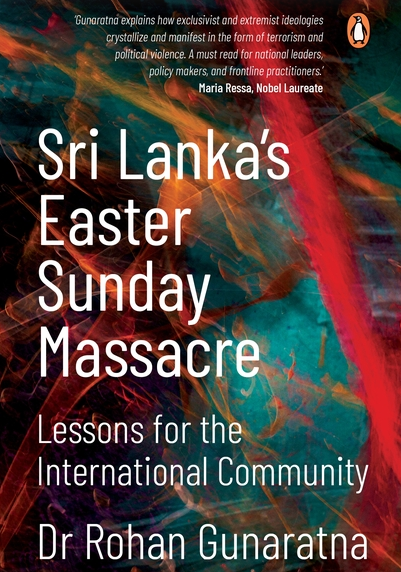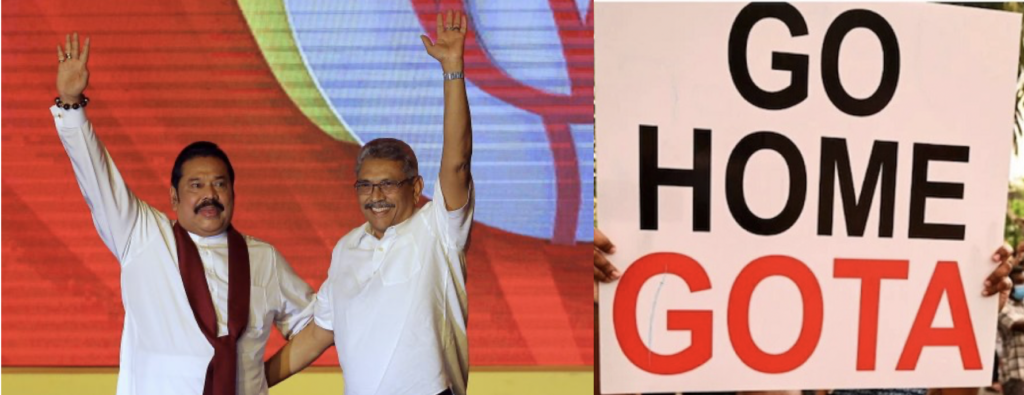De-radicalisation of ideology is the best way to tackle Islamic terrorism: Lankan expert
July 23rd, 2023By P.K.Balachandran Courtesy NewsIn.Asia
Colombo, July 23: In his book on the 2019 Easter Sunday bombings in Sri Lanka, internationally known terrorism expert Dr.Rohan Gunaratna says that de-radicalization of Islamic ideology is the best way to tackle Islamic terrorism.
In Sri Lanka’s Easter Sunday Massacre: Lessons for the International community (Penguin 2023), Gunaratna says that Islamic terrorism is but an outgrowth of Wahhabism or Salafism, which is spreading rapidly across the world using modern tools of communication. It will be futile to try combating Islamic terrorism if nothing is done to destroy its ideological roots.
Gunaratna, who is Professor of Security Studies at the S. Rajaratnam School of International Studies, Nanyang Technology University, Singapore, says that the April 21, 2019 bomb blasts which claimed more than 200 lives, could recur if Sri Lanka continues to lack a legal and policy framework to curb radicalization and promote moderation, tolerance, and coexistence in its place.
Typically, governments look to arresting the perpetrators after blasts but do not take steps to prevent the blasts, the researcher says.
Governments should also build and constantly maintain capabilities in the military, law enforcement, and the intelligence agencies to prevent and pre-empt terrorist attacks, he adds.
For a de-radicalization process to succeed, Sri Lanka has to develop a common approach by eschewing confrontational politics and forging consensus on a national security agenda. Security lies in social and religious harmony. Therefore, there should be no partisanship in these matters.
Religious extremism fostered by the Wahhabist and Salafist Islam and their institutions is reflected in religious exclusivism” Gunaratna points out. Therefore, any tendency towards religious exclusivism should be combated both by State and community action.
The exclusivist tendency is manifested in the Wahhabists’ avoidance of the company of moderate Sufi Muslims and those following other religions. Such avoidance reinforces negative feelings about persons following other religions. Gunaratna says that Sufi Muslims did not get radicalized partly because they abhorred extremism and violence and partly because the Wahhabists avoided them.
The Easter Sunday attack demonstrated a number of gaps, loopholes and weaknesses in the national security framework. On whether there could be similar attacks in the future, Gunaratna says that it would be suicidal to ignore the potential for a repetition. With enhanced globalization, ease of travel, migration, and advances in communication technology, ideas travel fast, with few restrictions. And action follows.
The Easter Sunday attacks were inspired by events in the Middle East and the ISIS’s counter actions there. Inspiration from Islamic extremists in South India such as P.Jainulabdeen (PJ) also contributed to the radicalisation of Zahran Hashim and his bunch of desperados.
Although terrorism is not new to Sri Lanka, the emergence of Islamic religious exclusivism, extremism, and terrorism presents a new set of problems. Islamic radicalism had been growing without being noticed by the powers-that-be, Gunaratna points out.
Three decades preceding the Easter massacre, radical Salafi-Wahhabi and Jamaat-e-Islami ideologies separated Muslims from non-Muslims. Foreign ideologies supplanted the inclusive Sri Lankan Muslim heritage. These virulent ideologies crystallized in operational cells, networks, and groups that gravely damaged national unity.”
The political and intelligence community noticed this development but did not see them as a threat. Even after the Easter blasts, the appreciation of the threat is weak, Gunaratna says. Many of the banned Wahhabi groups continued to operate either clandestinely or by infiltrating like-minded entities.
Although the ring leader of the terrorists Zahran Hashim committed suicide, his ideology endues. And as long as the ideology of hatred against traditional Muslims and other faiths persists, it is likely that Sri Lanka will suffer other copycat fanatics. Dismantling the ideological foundation is the apex challenge,” Gunaratna says.
But that was not done during the Yahapalnaya (Good Governance) regime headed by President Sirisena between 2015 and 2019. According to Gunaratna the security and intelligence platforms were systematically dismantled. The architect of the security structure Brig.Suresh Salley was posted to Malaysia and politicians were allegedly under pressure from the human rights lobby to direct the police to arrest and imprison intelligence officers.
The very effective Operation Blind Eye” of the Directorate of Military Intelligence (DMI) in the Western Province was called off. Sgt.Khaleel, who was familiar with Zahran’s activities in the Eastern Province was in jail from 2016 to 2021. Intelligence personnel knew all the Easter Sunday attackers but they lacked political patronage and legal support to keep the threat under check, Gunaratna says.

However, under the Mahinda Rajapaksa Presidency, Defence Secretary Gotabaya Rajapaksa had raised the radicalism issue with the President of the All Ceylon Jamiyyathul Ulama (ACJU) Mufthi MCM Rizwe. Rizwe promised to address it but failed. Harmony Centres” were to be set up to reduce the animosity between the Wahhabis and the Sufis. But few came up. This was the situation even after the 2019 blasts, Gunaratna points out.
A number reports had come out after the blasts which had valuable suggestions. Among the suggestions were: screening and certifying local and foreign clerics; blacklisting hate speakers; developing a wholesome curriculum for clerics to bring out the commonalities among various religions and not just the differences; regularly reviewing what is taught to the clerics to remove objectionable material like justification of violence; setting up a Council of Religious Harmony at the national level as in Singapore.
There has been no effort to work out a political consensus on the national security threat from fundamentalism. When Justice Minister Wijedasa Rajapakshe told parliament that more than 30 Sri Lankans had gone to Syria to fight for the ISIS, he came in for heavy flak though he was only basing his statement on intelligence reports.
Gunaratna regrets that there is no awareness of the security dimension among political leaders across the board. Awareness needs to be created. Intelligence agencies must keep their political bosses informed and updated. Intelligence agencies must acquire greater competences by recruiting specialists in a variety of fields from various technologies to the social sciences.
There should be inter-agency collaboration. One way of doing this will be to interchange personnel. The head of the Directorate of Military Intelligence and State Intelligence Service (SIS) must be equal in rank with the chiefs of the three armed forces. There should be a National Security Council and a National Security Advisor of cabinet rank. To back up security-related action, there should be a National Security Act, Gunartana suggests.
A Foreign Interference Act has also been suggested to prevent interference from geopolitical actors operating under the pretext of achieving human rights, democracy and religious freedom.” Foreign actors reportedly give grants to destabilize cultures, promote divisive ideologies and break up countries.”
Opposes Lifting of Ban
Against this background, Gunaratna disapproved of the Sri Lankan government’s latest decision to de-list five of 11 Islamic organizations which had been banned following the Easter Sunday blasts.
In a note to this writer, he said: After Muslim radical clerics and politicians lobbied the government, the government has decided to delist a number of Salafi Wahhabi groups. Like other governments, the Sri Lankan government too has compromised national security for personal and political gain. To secure votes and donations and remain in power, politicians weaken the nation’s long term national interests.”
Although politicians believe that giving into such political demands by ethnic and religious entrepreneurs will benefit them, it does not. It erodes national unity and social cohesion and eventually results in ethnic and religious hatred culminating in violence. Instead of pursuing narrow political interests, national leaders should integrate ethnic and religious leaders into mainstream national politics.”

